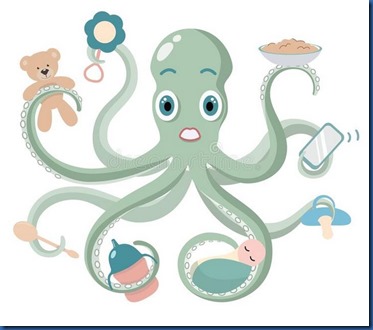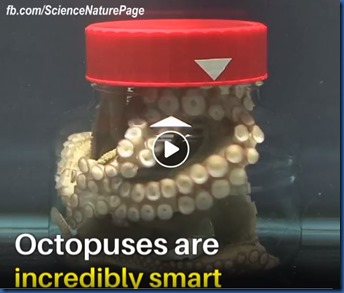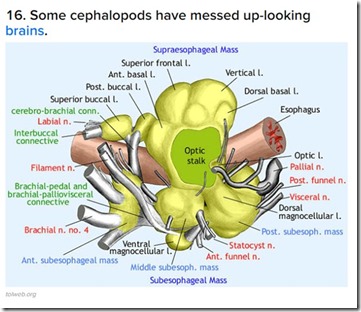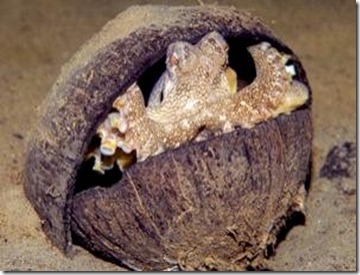Octopus pancakes anyone? Well, no octopi were harmed in the making of your breakfast at Ayada.
The Original Octomom
Happy Mothering Sunday! Especially to those octopus moms out there. Deep-sea octopuses are some of the best mothers in the animal kingdom. Once her eggs are laid, the octopus spends the next 5 years carefully nurturing and watching over the eggs until they are ready to hatch. Once her babies have emerged, the mother dies, her reproductive duties now complete.
QI: Octopi in the Blue Yonder
QI: How does an octopus smell?
A: Depends if he’s had cabbage chilli for dinner (ba-dum-dum). *BUZZ*.
A: With its nose?
QI: *BUZZ* As this Harvard researcher determined, and like so many other activities in the octopus’ fascinating life, with its suckers (“Touch and taste? It’s all in the suckers”)
Happy Octopus Day! If an octopus seems otherworldly with all of these bizarre qualities, then maybe it more so than you realized according to Big Think – “Octopus-like creatures inhabit Jupiter’s moon, claims space scientist” With the Maldives otherworldly’ aquatic vistas, snorkeling with an octopus might be the closest thing you can get to experiencing an alien encounter in the zero gravity of space.
The Curious Octopus
The octopus’ abilities seem downright otherworldly. In fact, a number of scientists writing in the Progress in Biophysics and Molecular Biology have proposed literally that octopuses come from another planet through a process called “panspermia” where “microbes, viruses and even tiny life forms like the tardigrade might travel dormant from space rock to space rock via collisions, eventually making their way to new planets” (though the consensus in the marine biology community is that such a conjecture is “fanciful”).
But sometimes truth is stranger than fiction and the actual mechanism for many of the octopus’ extraordinary capabilities has to do with maybe its strangest trick of all – changing its own genetic material. Scientific American’s article “Curiouser and Curiouser–Octopus’s Evolution Is Even Stranger Than Thought” described the bizarre genetic sleight of hand of the octopus…
- “These aquarium oddities can modify the proteins found in their bodies without having to change the basic sequence of their DNA blueprint…The new paper reports on a process called ‘RNA editing,’ which involves enzymes swapping out one RNA base (or nitrogen-based “letter” in the RNA/DNA alphabet) for another, presumably in the interest of an organism adapting to its environment. RNA editing is rarely employed in most animals…’No one knows why cephalopods are so keen on RNA editing. Perhaps it is a faster, easier way to adapt to their environment than waiting for a random mutation to occur. Or maybe it better suits their relatively short life spans. Cephalopods grow up fast and die young . Most live only for a few years and they only breed once. Ragsdale feels RNA editing may help them navigate what are often lonesome, fleeting lives. ‘This may explain why they’re such good problem solvers. No one’s around to show them how to figure out the world!’ Ragsdale says, ‘How to make their dens. How to camouflage themselves and attack prey. They’re on their own, and fortunately for them they have big brains and can sort matters out’.”
For a stunning example of self-camouflage, beyond the colour and even texture changing trickery of their skin, check out Blue Planet’s piece on their sub-aquatic sartorial skills…
Cute Li’l Fish Day
The octopus’ Cephalopod cousin, the cuttlefish, is no less intriguing. Itself a clever chappie, they have one of the highest proportions of brain size to body size of all invertebrates. But all the more crazy is that the brain itself is shaped like a donut (a bit of a messed up donut) and the esophagus passes straight through the hole. They must really get serious brain freeze when they eat ice cream too fast!
QI 14
- Q: What colour is the blood of an octopus?
- A: Red?
- Q: Buzzzz…no blue.
- Q: How many hearts does an octopus have?
- A: Ah, you said “hearts” so it must be 2!
- Q: Buzzzz…no, they actually have 3.
- Q: What does the octopus have 8 of that as inspired technological innovations?
- A: Legs?
- Q: Buzzz…8 layers of films that make up their cornea – used in camera technology to reduce the number of lens so reducing costs of cameras
- Q: Give me an incorrect version of the plural for “octopus”.
- A: “Octopuses”?
- Q: Buzzzz. Actually “octopuses” is perfectly acceptable English. You can also refer to them as “octopedes”
Octopus Day today. One of our favourite things to see underwater. And yet so elusive. We never see enough of them (although we did have fun encounter on the Olhuveli house reef this summer with the creature in question playing hide-and-seek with us changing his skin texture and colour with every new hiding place her moved to).
If you think the fun facts above are intriguing (thanks Isley), you ain’t seen nothing until you read about the Pillow Octopus…
- Female pillow octopus is 40,000 times larger than the male. Equivalent of a male human dating a woman 4 times larger than the Statue of Liberty
- For a male pillow octopus to “pull one off” is actually more literal than colloquial. Hectocautilus – arm that contains sperm. Gets broken off and then they die within a year. Only reproduce once. (Female dies after reproducing too)
- Pillow Octopus are known to rip of tentacles of a portugese man-o-war (built up resistance to poison) and use them as swords. Some octopuses have learned to open jars (where their food was kept)
Octopi are clever creatures. They have personality and have been observed playing, problem solving, learning. In fact, some octopus use coconut shell halves as a portable home (see photo at top).
Octopus’s garden in the sea is a curious place indeed.




